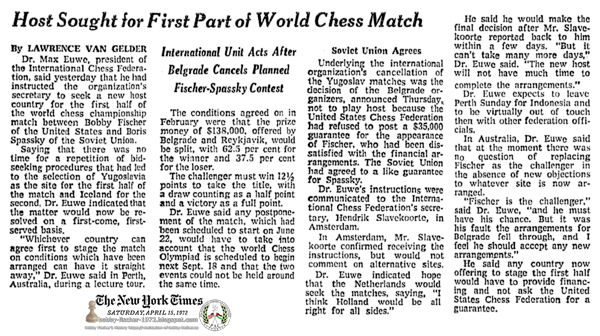New York Times, New York, New York, Saturday, April 15, 1972 - Page 11
Host Sought for First Part of World Chess Match by Lawrence Van Gelder
International Unit Acts After Belgrade Cancels Planned Fischer-Spassky Contest
Dr. Max Euwe, president of the International Chess Federation, said yesterday that he had instructed the organization's secretary to seek a new host country for the first half of the world chess championship match between Bobby Fischer of the United States and Boris Spassky of the Soviet Union.
Saying that there was no time for a repetition of bid-seeking procedures that had led to the selection of Yugoslavia as the site for the first half of the match and Iceland for the second, Dr. Euwe indicated that the matter would now be resolved on a first-come, first-served basis.
“Whichever country can agree first to stage the match on conditions which have been arranged can have it straight away,” Dr. Euwe said in Perth, Australia, during a lecture tour.
The conditions agreed on in February were that the prize money of $138,000, offered by Belgrade and Reykjavik, would be split, with 62.5 per cent for the winner and 37.5 per cent for the loser.
The challenger must win 12½ points to take the title, with a draw counting as a half point and a victory as a full point.
Dr. Euwe said any postponement of the match, which had been scheduled to start on June 22, would have to take into account that the world Chess Olympiad is scheduled to begin next Sept. 18 and that the two events could not be held around the same time.
Soviet Union Agrees
Underlying the international organization's cancellation of the Yugoslav matches was the decision of the Belgrade organizers, announced Thursday, not to play host because the United States Chess Federation had refused to post a $35,000 guarantee for the appearance of Fischer, who had been dissatisfied with the financial arrangements. The Soviet Union had agreed to a like guarantee for Spassky.
Dr. Euwe's instructions were communicated to the International Chess Federation's secretary, Hendrik Slavekoorte, in Amsterdam.
In Amsterdam, Mr. Slavekoorte confirmed receiving the instructions, but would not comment on alternative sites.
Dr. Euwe indicated hope that the Netherlands would seek the matches, saying, “I think Holland would be all right for all sides.”
He said he would make the final decision after Mr. Slavekoorte reported back to him within a few days. “But it can't take many more days,” Dr. Euwe said. “The new host will not have much time to complete the arrangements.”
Dr. Euwe expects to leave Perth Sunday for Indonesia and to be virtually out of touch then with other federation officials.
In Australia, Dr. Euwe said that at the moment there was no question of replacing Fischer as the challenger in the absence of new objections to whatever site is now arranged.
“Fischer is the challenger,” said Dr. Euwe, “and he must have his chance. But it was his fault the arrangements for Belgrade fell through, and I feel he should accept any new arrangements.”
He said any country now offering to stage the first half would have to provide financing and not ask the United States Chess Federation for a guarantee.
The Honolulu Advertiser Honolulu, Hawaii Saturday, April 15, 1972 - Page 43
San Francisco Herb Caen: Bigga Deal
Promoter Cyrus Weiss of our town, backed by mysterious sources, flew to N.Y. Thursday to offer Chess Champ Bobby Fischer a $200,000 purse to play Russia's No. 1, Boris Spassky, at our Palace of Fine Arts for the world title in June. Half of the match is already set for Reykjavik, Iceland, but the other half is up for grabs…
The Times San Mateo, California Saturday, April 15, 1972 - Page 36
Chessboard Is Nation's Field of Honor
At last it has been settled.
Bobby Fischer will play Boris Vasilyevich Spassky for the chess championship of the would. The match will begin on June 22 and when it is over many experts think there will be a new champion.
The chess world is holding its breath. For, if he wins the title, he will be the first non-Russian to hold the championship in 35 years and he would be the first American ever to win it.
Many consider Fischer a cinch but he has never beaten Spassky even though they have met on only a few occasions. Further, Spassky did not get to he chess champion of the World by being a pushover.
In may ways Fischer and Spassky are alike, although Spassky lost both of his parents at the siege of Leningrad and was orphaned at the age of five. Both players are totally dedicated to chess and have almost no other interest.
Spassky was only about six years old, so the story goes, when he played the then world champion Mikhail Botvinnik in an exhibition. He supposedly beat Botvinnik and the champion predicted “This boy will become world champion.”
Spassky has studied and analyzed tens of thousands of variations upon variations of moves. He has few close friends and lives for chess. In the Soviet Union he gets a lot of help because in Russia the government subsidizes such things as chess champions.
Fischer will go into the match all alone with only his own ability and wits to guide him. But Spassky will have with him a veritable “brain trust.” Officially, at the moment, he will have Igor Bondarevsky, his coach; Ivor Nei, an international master and advisor; Yefim Geller, Soviet grandmaster; and finally, Nikolai, a psychologist.
Spassky will also have whole nation united behind him. Chess is Russia's pride.
Each player will indeed have the prestige of his country riding on his skill. Duels between Russians and Americans always seem to work out that way.


























